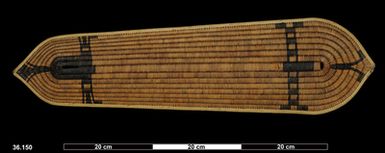Connect with Horniman Museum and Gardens
Contact this content partner to get more information about this item.
shield (weapons: accessories)
- Description:
- Basketry Shield, Reoreo, Collected on Bugotu, Solomon Islands, Central Melanesia Although most discussion of Solomon Islands shields has focused on the twenty or so shell-inlaid examples, the overwhelming majority in museum collections are more functional examples in plain basketry. It may seem strange to imagine choosing to make a shield of basketry as a defence against steel-bladed war axes or bone-barbed spears, but this unusual kind of shield is designed to absorb a blow and become entangled with the attacker’s weapon. An axe or spear striking such a shield cut easily into the shield’s basketry core, but became tangled up in its coiled fibres. In this way, the attacker was disarmed or distracted, and left open to an easy counter-attack. Shields of this kind were to be found throughout the central Solomon Islands, and this particular example was purchased on Bugotu, where such objects were termed reoreo. They were generally made in the interior of Guadalcanal, however, and traded outwards from there. In its elliptical shape and very abstract scheme of decoration portraying a human figure, the reoreo has few parallels in other Pacific cultures. Its closest similarity is perhaps the vayola shields of the Massim region in Papua New Guinea. Vegetable fibre, pigment. Late 19th Century. Sold to the Horniman Museum in 1936 by a Mrs Bellamy. Basketry shield of elongated and pointed teardrop shape. The shield is woven in three colours; a natural rolled Pandanus (?) leaf , with a paler border woven into a chevron design and three separate areas of black Pandanus (?) fibre woven into the central body. The black design is highly abstract on this example but others show it to be abstracted elements of a human figure. The arms legs and head dress are still identifiable.
- Format:
- image
- Collections:
- Horniman Museum and Gardens
- Content partner:
- Horniman Museum and Gardens
- Availability:
- Not specified
-
Copyright status: All rights reservedFind out more about what you are able to do with this itemThis item is all rights reserved, with means you'll have to get permission from Horniman Museum and Gardens before using it. For more information, please see our use and reuse page.More informationHorniman Museum and Gardens has this to say about the rights status of this item:
http://rightsstatements.org/vocab/InC/1.0/
What can I do with this item?Non-infringing useNZ copyright law does not prevent every use of a copyright work, and this item may be hosted by an international institute or organisation. You should consider what you can and cannot do with a copyright work.No sharingYou may not copy and/or share this item with others without further permission. This includes posting it on your blog, using it in a presentation, or any other public use.No modifyingYou are not allowed to adapt or remix this item into any other works.No commercial useYou may not use this item commercially.
Welcome and warm Pasifik greetings
The information on this site has been gathered from our content partners.
The names, terms, and labels that we present on the site may contain images or voices of deceased persons and may also reflect the bias, norms, and perspective of the period of time in which they were created. We accept that these may not be appropriate today.
If you have any concerns or questions about an item, please contact us.


